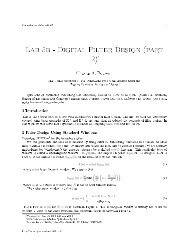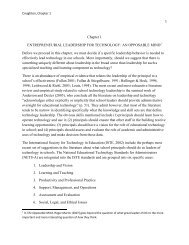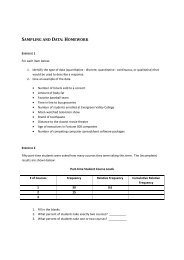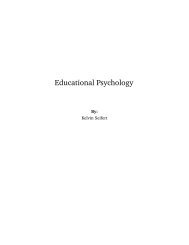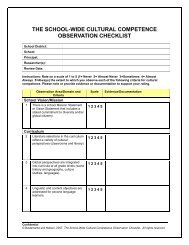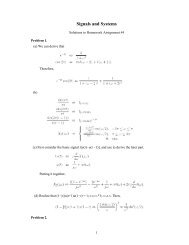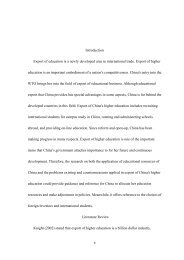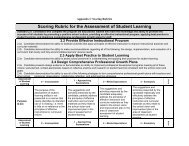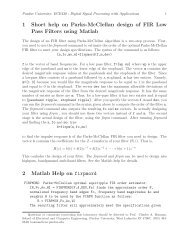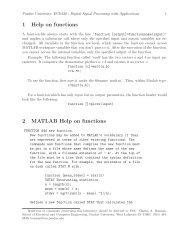Blazing New Trails - Connexions
Blazing New Trails - Connexions
Blazing New Trails - Connexions
You also want an ePaper? Increase the reach of your titles
YUMPU automatically turns print PDFs into web optimized ePapers that Google loves.
328 CRITICAL ISSUES IN EDUCATION LEADERSHIP PREPARATION<br />
faculty in the development of a judgment system that allows them to accept or decline certain<br />
situations that would compromise their growth in the department and the profession.<br />
Green (2008) pointed out that while the university tenure process is consistent in their<br />
expectations for scholarship, teaching, and service, the emphasis placed on each of these areas<br />
is inconsistent. Therefore, a mentor from the tenured faculty could assist novice faculty<br />
members further by helping to clarify the importance placed on these areas to avoid wasting<br />
valuable time and energy. Regarding service, this statement was further supported by one of<br />
the respondents, “make them [assistant professors] aware from the very beginning about the<br />
requirements for service related to tenure.” Another professor shared, “senior faculty should<br />
guide junior faculty into the level of service participation which is acceptable.”<br />
If the goal of an assistant professor is to achieve tenure, then all areas and expectations<br />
of the process as well as a mentor should be afforded to them if they are to achieve that goal.<br />
The lack of information and assistance could mean failure for some. Mantero (2004)<br />
recognized the true meaning of tenure when he wrote, “We are here to teach well, pursue<br />
sound research, and try to improve the world around us in some way. If we do those things,<br />
then tenure will follow” (p. 2). If that is the case, then junior faculty deserves the information<br />
and assistance they need to not only meet tenure requirements but achieve tenure. Clearly, as<br />
suggested by Young (2002), “Traditional notions of teaching, research, and service need to be<br />
revisited” (p. 3).<br />
While the service arm of the tenure process garners less attention than scholarship and<br />
teaching as revealed by the responses from this study, completed service endeavors are still of<br />
importance. Junior faculty should seek ways in which their service also relates to their<br />
teaching and research agendas. Service, as one of the professors shared, “expands the<br />
individual’s horizons.” While another added that service “is an essential aspect of the<br />
professional role. It causes and reinforces the fundamental human nature of university<br />
teaching and scholarly practice.” Until the area of service is eliminated from college and<br />
university tenure policies, it would serve a new assistant professor well to become involved in<br />
the various aspects of the service requirement.<br />
Tenure is not always a result of what a candidate does but the quality in how they do<br />
something (The Colorado State University Tenure and Promotion Policy, n.d). Service related<br />
activities can actually, contrary to common beliefs, “enhance…academic contributions” (The<br />
Colorado State University Tenure and Promotion Policy, n.d, p. 1). Whicker et al. (1993)<br />
suggested that having a “good performance record” may prevent a tenure-track professor from<br />
“having difficulties at tenure time” (p. 143).<br />
REFERENCES<br />
Boreen, J., Johnson, M. K., Niday, D., & Potts, J. (2000). Mentoring beginning teachers: Guiding reflecting,<br />
coaching. Portland, ME: Stenhouse Publishers.<br />
Colorado State University. (n.d.). Service-learning: Influencing tenure and promotion. Retrieved from<br />
http://tilt.colostate.edu/guides/tilt_servicelearning/practices_tenure.cfm<br />
Filetti, J. S. (2009, Nov.). Assessing service in faculty reviews: Mentoring faculty and developing transparency.<br />
Mentoring and Tutoring: Partnership in Learning, 17(4), 343–352.<br />
Florida Atlantic University. (2006, August). Promotion and tenure criteria. Retrieved from http://med.fau.edu/<br />
biomedical/promotion_and_tenure_criteria.html<br />
General guidelines for the preparation of supporting materials and the management of tenured and tenuredtrack<br />
candidate promotion files. (2010, Fall). Retrieved from http://www.utexas.edu/provost/policies/<br />
evaluation/tenure/Guidelines%20T.TT.pdf



